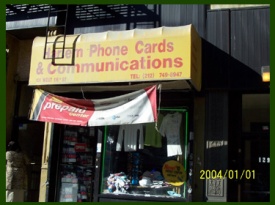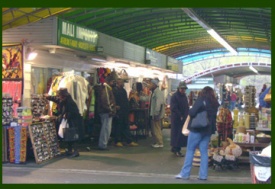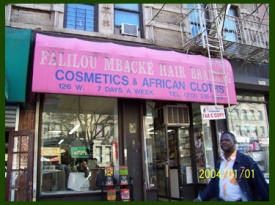Women and Children
From The Peopling of New York City

| ||||||||
|---|---|---|---|---|---|---|---|---|
OverviewAs the sun rises in Senegal, women walk to their local well to fetch water. A quarter-way around the world, you can find Aida, a middle-aged Senegalese woman, selling jewelry and wooden dolls at the Malcolm Shabazz Street Market on 116th Street in Harlem. The difference is striking; women are more liberated in New York than in Senegal, with more acceptance and more ways to earn a livelihood. Whether women's greater independence in New York is a good or bad thing depends on whom you're asking. Thanks to the media, the Senegalese people now see some of the positive aspects of America instead of the negative ones. For example, women in Senegal now want to be independent and self-asserting, like American woman. But, according to a member of the Association of Senegalese in America (ASA), "Good women can't [be independent], only bad women can." However, one thing that Senegalese women have in common no matter where they are is that, as Aida said, "women are always doing business or carrying out transactions." Raising children in America can also be a challenge. Fatou, a Senegalese-American high school student, knows this firsthand. “Over here there’s less freedom," she says. "In Senegal, you can do more of what you want to because everyone knows each other.” Here in America, Fatou's activities are limited because her parents want her to be safe and believe that the streets are dangerous. When school is over for the day, she has only two options: go to soccer practice and then go home, or go straight home. Fatou has both Senegalese and American friends here, but the friends she grew up with are still in Senegal, and she still calls them occasionally with phone cards. But if she was back in Senegal, she could talk to her friends all she wanted and have the freedom to roam around and even create her own fun and activities. It is important to note that Fatou is not speaking for all of the Senegalese women, but rather only for a part of first-generation Senegalese-Americans. There are also some young, first generation Senegalese-Americans that become so caught up in earning money that they forfeit their education and go into street-vending or the service industries. The social and economic trend of Senegalese women on a graph would be similar to the infamous hockey stick curve.Women's Occupations in AmericaTraditionally, the role of Senegalese women was limited to the home. This would change as cash crop farming (peanuts) fallowed the soil of Senegal and men were forced to set out to “first-world” countries and begin to trade. Hostility from their previous colonizer, France, led the Senegalese overseas to the United States. The effects that this economic change had on the Senegalese men would, in turn, affect the Senegalese women, as their social and economic roles expanded in order to help provide for their families. These immigrants first started out as street vendors, but eventually got together and set up shop at 125th Street in Harlem. The traders would send money back home to support their families. As mentioned before, Aida is one such trader. During the weekdays, Aida is in downtown Manhattan doing "business," which may include looking for and purchasing new inventory during the weekdays. On the weekends, you can find her at the Malcolm Shabazz Market, either talking to her fellow traders and friends in a mix of French and Wolof or talking to clients in English. She says that the Malcolm Shabazz Market is busiest during the weekend afternoons and slowest during the winter time when it is cold and not many people want to come out. Her family members are all back in Senegal with the exception of her oldest son, who is here with her. She sends home a large portion of her income, and every so often she even travels back to Senegal both to see her family and buy new goods to bring back to America and sell. Another occupation of Senegalese women is in the food service industry. A perfect example of this is Didi, who waitresses at Africa Kiné, a Senegalese restaurant on 116th Street. The atmosphere of the restaurant is lively and leisurely, and you can find Didi chatting with the customers that return time and again because of the great food and service. Didi has been with Africa Kiné for five years and enjoys what she does. Besides being a trader or waitress, Senegalese women also go into the hair-braiding trade. As seen by most of the hair-braiding salons on 116th Street, hair-braiding is a woman's job. Women learn to hair-braid by having their own hair braided as children, then observing other adults doing it, and eventually doing hair-braiding on someone else. Depending on the length and style requested by the customer, one job could take up to several hours. The cost also depends of the length and style, but can range up to $150 dollars and will last for several weeks.While men were able to venture out to seek jobs and opportunities in making money, women still faced economic constraints (e.g. it was only in 2001 that Senegal voted in a new constitution that granted women the same property rights as men). Due to extremely lucrative bartering, Senegal's economy has been steadily rising. The standard of living has risen, widespread education has been implemented, and most importantly, there as been a large growth in the amount of jobs offered to women outside of the household. Raising ChildrenInstilling Cultural ValuesThe situation of the Senegalese youth is a very interesting one when compared with that of children of other immigrant groups. Generally, the trend is for many young people to assimilate more into American culture; not necessarily to forget where they and their parents came from, but to begin to see themselves as more American and less Italian, Russian, Chinese, etc. However, it would appear that this is not the case with many of the Senegalese youths. They wear their identity proudly and value it equally to, if not more than, being American. This is shown by the strong connection that they have with Senegal, as well as the intent of many to return to Senegal after receiving their education. Though the Senegalese come to America seeking opportunity for themselves and their families, they do not forget where they come from, nor do the virtues of growing up in Senegal disappear. As Fatou asserts, there is much more freedom for children back in Senegal. In addition, there are the benefits of growing up in Senegal and learning about its rich culture. Senegalese parents in America consider this when deciding what to do with their first generation children. Many of them choose to send their children back to Senegal at young age, so that they may get a proper Senegalese education. Struggles in EducationHowever, this setup is not without its problems. Growing up in America, many children are not in touch with their Senegalese roots, nor do they have a strong command of the French or Wolof language. This presents a problem when they return to Senegal, but that problem is often solved after a few months of immersion in the Senegalese society. This is a gain in terms of cultural education, but the break sets them back in their American schooling. They return having fallen behind others their age; and though they now know French, they have forgotten much of the English they had previously learned, further hindering their education. This language barrier poses further problems when Senegalese-American children try to become friends with non-Senegalese. Sometimes fights occur because of miscommunication and misunderstandings. The Secretary of The Association for Senegalese of America (ASA) tells his sons to not cower but rather to "fight back...only with reason". As Fatou puts it, "the African American children call you American while the American children call you African American." Neither the African Americans or Americans will acknowledge the Senegalese as one of their own. This presents an identity crisis to the children and creates yet another obstacle to overcome. Thus, the education of Senegalese children is a double-edged sword. Parents must strive to find the right balance between teaching their children in the Senegalese way and still preparing them for life in America. To ease the transition and find balance, the Secretary of The ASA said that there have been many "Baby College" programs set up within the last couple of years to prepare these children for college. These programs are directed at Senegalese children, helping with pre-college processes like applications. The Secretary of The ASA is thinking of setting up a program in Senegal to teach the children English. Retired 50-year-old Senegalese people who have spent time in America and have a lot of free time will serve as the teachers. Through this program, the children will maintain their English as they receive education on the Senegalese culture and language from the formal Quranic schools (called daaras in Wolof). When Fatou grows up, she said that she would go back to Senegal and teach the children English so that when they go or return to America, they won't be at a disadvantage of not knowing English. The Importance of Language(s)It is clear that in order to be successful in America, you have to know English. The importance of language is evident in Aida's case and the case of the children. If Aida didn't know how to speak English, how would she communicate with her customers that might not know how to speak Wolof or French? If the Senegalese-American children didn't know how to speak English, how would they interact and make friends with other children that only knew English? When Fatou first started going to school in America, she had a difficult time adjusting because at the first school she attended, nobody spoke Wolof, very few spoke French, and she didn't know English. After transferring to a new school, she met children who could speak both Wolof and French, and these friends helped her adapt to the new environment she was in. Almost all the Senegalese immigrants, whether children or adults, know either Wolof or French or both, but only a few know English upon arrival in America. Within time, most of the adults pick up the English language, and the children learn English from going to school. Aside from culture and religion, language is also a bond that people share. |



